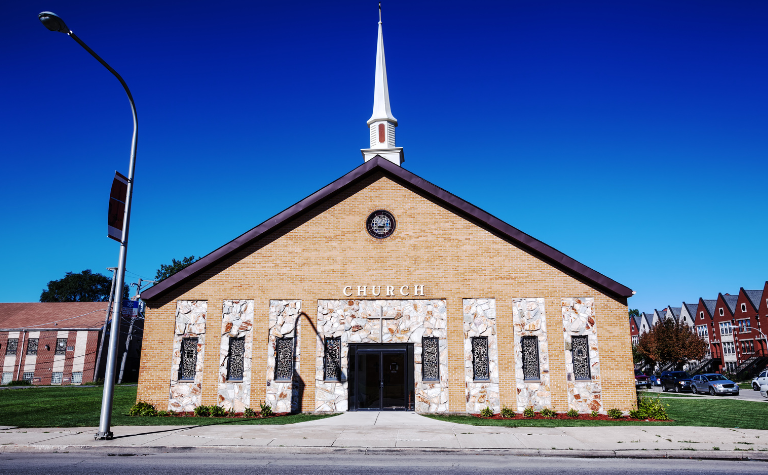The Church of God, headquartered in Anderson, Indiana, is a worldwide Christian tradition committed to unity and spiritual growth. It’s known for its non-denominational stance and embodying Christ’s love in action. This makes many people want to know what they believe and why.
The Church of God holds sanctification as a second grace, enabling a life of holiness free from willful sin. Speaking in tongues is seen as a spiritual gift but not necessary for salvation. it also believes in divine healing and the imminent, physical Second Coming of Jesus Christ.
How does the Church of God’s view of sanctification and holiness differ from other traditions? What are the details of the denomination’s view of speaking in tongues? How is the Church of God (Anderson, Indiana) different than other Church of God traditions? Keep reading to learn the answers to these questions and others.
Also, compare the Church of God with other churches on the Christian Denominations Comparison Chart.

The Church of God Emphasizes Sanctification
The Church of God teaches that a further act of grace called sanctification occurs after becoming a Christian. This is a definitive work of the Holy Spirit, through which the believer is set apart for God’s service, and their heart is cleansed from original sin.
| Sanctification | Church of God | Opposing View |
|---|---|---|
| Definition | Sanctification in the Church of God’s view is considered a second work of grace, a process by which a believer is cleansed from original sin and set apart for God’s service after their conversion. | Sanctification may not be viewed as a distinct second work of grace but rather as an ongoing process that begins at conversion and continues throughout a believer’s life. |
| Timing | For the Church of God, sanctification is a specific event that follows faith in Jesus Christ, distinct from and following justification or being born again. | Other Christian traditions see sanctification as an ongoing process that begins at the moment of justification and continues throughout the believer’s life. |
| Role of the Holy Spirit | The Church of God believes that the Holy Spirit performs a definite and instantaneous work of sanctification in a believer’s heart. | The Holy Spirit continually works within the believer, gradually transforming them into the image of Christ throughout their life. |
| Result | According to the Church of God, sanctification results in the believer living a life of holiness, free from willful sin. | Sanctification should lead to increased holiness and a decreasing frequency of sin, it is not expected to result in complete freedom from sin in this life. |
| Evidence | In the Church of God, the evidence of sanctification is a life free from sin, reflecting Christian perfection. | Evidence of sanctification is seen in a growing resemblance to Christ in character and actions, not necessarily a state of perfection. |
Please note that the “opposing view” presented in this comparison is generally representative of Reformed or mainstream Protestant theology and may not apply to all Christian denominations.
The Denomination Values Speaking in Tongues
As a Pentecostal denomination, the Church of God adheres to the belief in speaking in tongues. They see it as a spiritual gift that’s evidence of baptism in the Holy Spirit, although it is not required for salvation.
| Tongues | Church of God | Opposing View |
|---|---|---|
| Definition | The Church of God views speaking in tongues as a spiritual gift bestowed upon believers, serving as a sign of baptism in the Holy Spirit. | Non-Pentecostal traditions see speaking in tongues (glossolalia) as a phenomenon limited to the early Christian church, not necessary or expected for modern believers. |
| Necessity | In the Church of God, speaking in tongues is considered an important, though not necessary, sign of spiritual empowerment, indicating a believer’s baptism in the Holy Spirit. | Speaking in tongues is not considered a necessary manifestation of faith or a sign of spiritual empowerment. The emphasis is instead on other spiritual fruits or gifts. |
| Interpretation | The Church of God sees speaking in tongues as a heavenly or unknown language that may need interpretation in the church setting. | Speaking in tongues, if it occurs, is typically understood to be in a known earthly language (xenolalia), as described in the Acts of the Apostles during Pentecost. |
| Practice | Speaking in tongues is generally encouraged and practiced in Church of God worship services, often in a communal setting. | Speaking in tongues is rarely practiced and is not a significant part of worship services. |
| Role in Salvation | The Church of God does not view speaking in tongues as a requirement for salvation. Salvation is through faith in Jesus Christ alone. However, speaking in tongues is seen as a subsequent experience in the believer’s spiritual journey. | Speaking in tongues is not required for salvation. Salvation is seen as solely by grace through faith in Jesus Christ, and spiritual growth is measured by other fruits of the Spirit. |
Also, see What Is the Largest Denomination In Each State? to learn more.

Divine Healing in Church of God Beliefs
The Church of God believes in divine healing, a literal interpretation of scriptures suggesting that faith may lead to miraculous healing. They affirm this can coexist with medical science.
| Healing | Church of God | Opposing View |
|---|---|---|
| Belief in Healing | The Church of God holds a firm belief in divine healing. They believe that God can miraculously heal sickness and disease in response to faith and prayer. | God can heal, but it’s not always His will to do so. Divine healing isn’t guaranteed and may not be a primary focus in faith practice. |
| Healing and Faith | The Church of God often sees a strong connection between faith and healing, believing that the depth of a person’s faith can influence their healing. | Doesn’t tie the occurrence of healing directly to a person’s faith. Healing can happen irrespective of the strength of one’s faith and may also not happen despite strong faith. |
| Healing and Prayer | The Church of God believes in the power of prayer for healing. Laying on of hands and anointing with oil are common practices in prayer for healing. | Prayers might be more for strength, comfort, and acceptance, whether or not healing occurs. |
| Role of Medical Science | The Church of God believes in divine healing but does not reject medical science. The two can coexist, and both are seen as ways God can bring about healing. | Others might place a stronger emphasis on medical science, viewing it as God’s primary method for healing in the present age. Divine healing, if it occurs, might be seen as less common or more indirect. |
| Testimony of Healing | Testimonies of divine healing are often shared in Church of God congregations as evidence of God’s power and grace. | Testimonies might focus less on miraculous healing and more on other aspects of God’s provision and care, such as strength in suffering or the skill of medical professionals. |
The Second Coming of Jesus Christ
They believe in the literal Second Coming of Christ at the end of the age. In their eschatological views, this will be followed by a millennial reign of Christ on earth. Here are some of the details of their beliefs:
Literal Return: They believe in a literal, physical return of Jesus Christ. This isn’t seen as a symbolic or spiritual event but a tangible reality that will occur at the end of the present age.
Premillennialism: The Church of God generally adheres to a premillennial view. This means they believe that Christ’s Second Coming will occur before a “millennium,” a thousand-year period of peace and righteousness during which Christ will reign on earth.
Rapture: Similar to other Pentecostal denominations, the Church of God also teaches the doctrine of the rapture, where believers will be caught up to meet Christ in the air.
Imminence: The Church of God believes in the imminence of Christ’s return, meaning that it could happen at any time. They encourage believers to be spiritually prepared for this event, although they don’t claim to know the exact date or time.
Final Judgment: Following Christ’s return, there will be a final judgment where the righteous will be rewarded, and the wicked will be condemned. This final judgment will inaugurate God’s eternal kingdom.
Holiness in the Church of God
The Church of God strongly emphasizes holiness, viewing it as a core aspect of Christian life. They believe in Christian perfection, a state of being sanctified or set apart for God, which is seen as a second work of grace following conversion. This doesn’t imply a life without mistakes but rather living a life free from willful sin.
The Church encourages believers to live out their faith practically, aiming to reflect Christ in their everyday actions and interactions. This holiness, rooted in God’s love, should manifest in personal life, relationships, and service to others.
Also, see the 100 Largest Denominations in America to learn more.

How is the Church of God (Anderson, Indiana) Unique?
The Church of God, based in Anderson, Indiana, differs from other Church of God groups in several key aspects. Here are a few ways it’s unique:
Non-denominational Approach
The Church of God (Anderson, Indiana) considers itself non-denominational. They stress unity among believers, irrespective of church affiliations, believing that the division into denominations is contrary to Jesus Christ’s teachings about unity among believers.
Lack of Formal Hierarchy
Unlike many other Church of God groups, this group doesn’t have a centralized governance structure or formal hierarchy. Instead, each congregation is autonomous, maintaining its own governance and making decisions independently, although they often collaborate with other congregations for various missions and initiatives.
No Formal Creed
Instead of a formal creed or doctrinal statement, the Church of God (Anderson, Indiana) uses the Bible as its only rule of faith and practice. They stress living according to the teachings of Jesus Christ and promote a practical Christianity that is applied in everyday life.
Holiness Movement
This group is part of the Holiness movement, emphasizing Christian perfection and personal holiness. However, unlike some other groups, they don’t typically associate this with a second work of grace or baptism of the Holy Spirit as distinct from conversion.
Eschatology
The Church of God (Anderson, Indiana) generally promotes premillennialism, believing in a literal thousand-year reign of Christ on earth following His second coming. However, as with other beliefs, there is room for differing interpretations within the group.
Also, see Catholic vs. Protestant vs. Eastern Orthodoxy to learn more.
Related Questions
The terms "Pentecostal" and "Church of God" commonly describe certain kinds of Christian churches. Many people know that the terms describe Protestant churches, but they aren't sure how Pentecostal...
The Assemblies of God and the Church of God (Cleveland, Tennessee) are two of the oldest Pentecostal denominations in the world. There is a lot that unites these Protestant-Christian traditions, yet...
